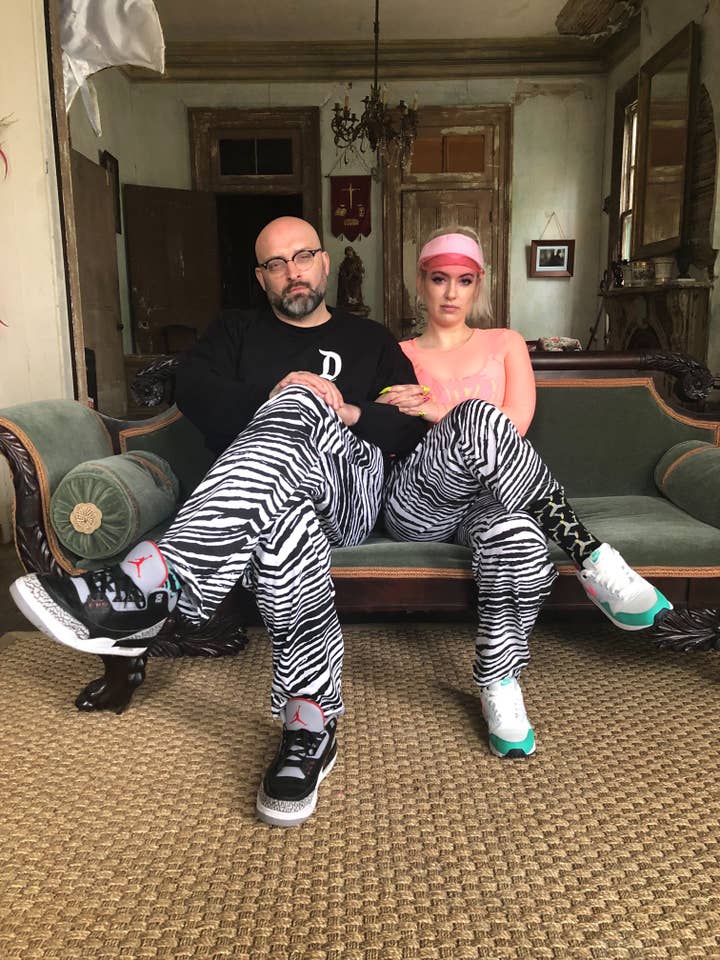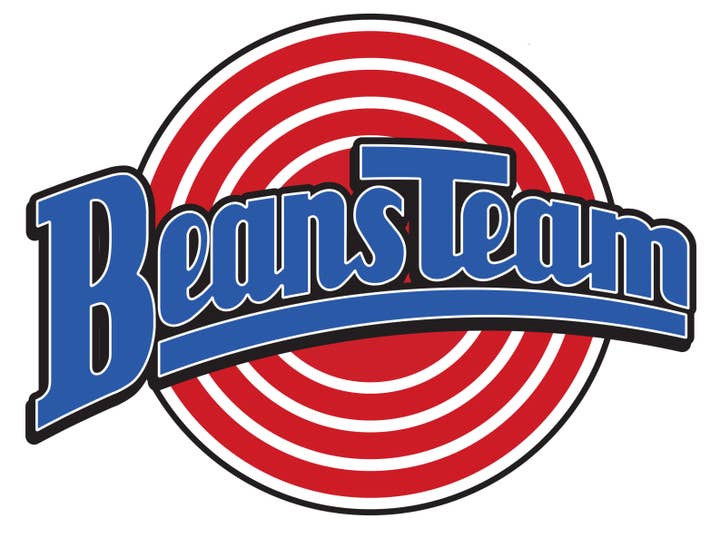Fueling a new studio with healthy brains and healthy Beans
Gabriela Salvatore and Dean Evans spill the beans on their new studio, Beans
When Far Cry 3: Blood Dragon creative director Dean Evans left Ubisoft in 2018, he was, per his own account, in a pretty bad place. A project he had invested deeply in had been cancelled, his marriage had collapsed, and he had "hit rock bottom."
Evans went to see some friends in London, and while he was there, he got a strange text from Devolver Digital co-founder Nigel Lowrie. It just said: "Want to start a studio?"
"This text was some kind of biblical light shining down from the sky," Evans describes.
In the process of ironing out details with Lowrie, he teamed up with his former Ubisoft colleague Gabriela Salvatore, who shared much of Evans' vision of game development and the kind of work environment he wanted to build. At the time, Salvatore was living in the UK, but says she was eager to move onto a new project away from AAA development.
"I didn't feel supported, which I feel like is such a big challenge, especially for women in the industry -- you do your job, you do other people's jobs that aren't picking up the slack," she says, joining Evans in an interview with GamesIndustry.biz. "And then you're doing the work of [diversity and inclusion] or trying to protect other people from harassment and stuff like that. So I was feeling super burnt out, and I wanted a bunch of support on stuff and I wasn't getting it."
"I was feeling super burnt out, and I wanted a bunch of support on stuff and I wasn't getting it"
Gabriela Salvatore
And both of them found a willing partner for their visions in Lowrie and Devolver.
"With regards to the AAA side of things, they don't exist to make great things," Salvatore continues. "They exist to make money, that's really the primary goal. And all we've ever really wanted to do is just make great things and have that as the primary driver. I don't think there are many publishers out there who share that kind of same view. Devolver is a perfect fit for that. The creative comes first, which is always very exciting."
Together, the two founded the newly-announced studio Beans in Toronto. While Devolver orchestrated its creation, Beans is fully independent -- though Salvatore says the pair currently intend to work with the publisher on all their projects moving forward.
"I promise nobody has a gun to our head," Salvatore laughs, acknowledging the Devolver Digital PR rep in the conference call with us. "It's such a breath of fresh air. I know both Dean and I have dealt with so much like weird gaslighting over the years, and it took a really long time to believe the things that [Devolver] said were the things that they meant. They've been so supportive and so lovely and aligned with our vision and everything that we've wanted to do going forward and very understanding of circumstances that come up."

I ask why the studio is named Beans. Evans initially replies by describing beans as a food -- they're full of protein and energy, they're cheap, easy to make, tasty, and "as a Brit, there is nothing better than beans on toast." But after a moment, Salvatore offers a more thematic answer.
"We're so tired of the ego that exists in games," she says. "People come out with studios, and it's like, 'Mind Breaker Studios.' I hope there's no studio named Mind Breaker. [Author's note: There is, but they've been quiet since 2014.] Apologies to Mind Breaker. I completely slandered them. But you know, you come out and everyone's like, 'We're going to blow people's minds, it's going to change the world!' And I just think beans are fun and they're kind of silly and stupid.
"We don't want to come out to E3 with a bunch of lasers and some crazy logo design that's also a sword or something. I think we're both just really tired of that era of games."
Salvatore and Evans are firm in their vision of what kind of culture they want for Beans. Both say they've been burned hard in the past by AAA development, and want to keep Beans not just small and flexible, but also grounded with an overall vision of mental wellness. Salvatore specifically tells me she's made herself sick in the past working on big projects, and that it was never worth it for her.
"I remember once working on this project, and it was the one that broke me," she says. "It was endless late nights. I was working several roles. There was no support except for the occasional desk beer and shitty overtime fast food. At one point, we all got piled into this room to address the rock bottom morale that everyone was feeling, and I thought when I came in, 'There's going to be an earnest dialogue, maybe even an apology.' Instead, we were told by the project leaders how lucky we were to be making something bigger than us.
"We don't want to come out to E3 with a bunch of lasers and some crazy logo design that's also a sword or something"
Gabriela Salvatore
"And I was like, 'We're making a video game. We didn't just solve world peace. We're making this video game that's gonna go on to be forgotten six months from now and replaced by something else.' And just remembering, wondering why we couldn't just have this honest dialogue instead, maybe about the toll it was taking on people. I feel like in that moment if I had just been heard, it would have been a lot easier to go back and just keep working."
Beans has already been operating prior to its announcement for over a year now, and in that year the two say they've learned a lot on putting their philosophy into practice. They tell me about multiple specific instances where they worked with employees to help support their physical and mental wellbeing in difficult situations, and Evans specifically says that he wants to work to break industry stigmas around going to therapy -- especially for men.
He also adds that another key component is constantly shedding hubris, and remaining "creatively humble."
"Our background was super competitive," he says. "At a lot of AAA studios, competition is what's bred. Teams are pitted against each other. Certainly at Ubisoft, you don't have one engine that everyone works on -- you have a bunch of different engines that everyone's competing on, and everyone's just rewriting features every single year. I can't stand aggressive competition; I much prefer friendly collaboration. That competitive nature was always at the cost of collaboration.
"People are always at their best when they're comfortable. So when they can be vulnerable, when there's this psychological safety to be able to ask questions and fail. It's okay to fail."
"I can't stand aggressive competition; I much prefer friendly collaboration. That competitive nature was always at the cost of collaboration"
Dean Evans
Salvatore agrees, telling a story of being in an all-male design meeting in a previous job when she mispronounced "Geralt" -- the main character from The Witcher series -- while trying to make a point about an upcoming directive for open-world features. Everyone in the meeting mocked her, she says, and her point and the discussion she wanted to spark were completely ignored.
"Years later, now, I'm not so much bothered by the comment, but more about the atmosphere," she says. "In these places, you show the tiniest bit of neck and they just clamp down. The idea of railroading the opinions of a junior or marginalized members of staff -- how are they ever supposed to feel comfortable talking to you? Dean and I were taught that to be heard you had to be the loudest in the room, and it's just not a sustainable model. I don't really want to have anyone including myself have to scream and fight to be heard, or to be taken seriously or to be respected. It should just be the status quo, the moment you walk in the door."
Practically, Salvatore says the studio's strategy is two-fold. Unsurprisingly, one part involves actually having formal practices and policies in place that dictate the kind of culture the company wants to have. But she adds that this has to go beyond just words -- Beans is working with an outside party to turn their culture ideas into actionable items, poll staff anonymously to see if they hit metrics, and advise on future actions depending on whether they meet those metrics or not.
"It's not like somebody comes in and they just say, like, 'Honesty,' and then we paint it up on the wall, and everybody forgets about it for six months," she says.

The second part is accountability. Salvatore and Evans try to be upfront about their own failings and weaknesses, and encourage other staff to do so without consequence. Rather than punishing those who struggle, they want to offer assistance like outside training, feedback, and opportunities to work with leads to improve skills to address pain points.
Alongside building the kind of working environment Salvatore and Evans envision, they are of course also building a game. All they can say about it so far is that Devolver Digital is publishing it, so while there is no guarantee anything I asked them about will make it into whatever thing they're cooking up, both offered some perspectives on the kinds of games, systems and technologies they're personally interested in.
"Dean and I were taught that to be heard you had to be the loudest in the room, and it's just not a sustainable model"
Gabriela Salvatore
Evans tells me he's a fan of "layered systems," like sandboxes, and games with nonlinear structures. He adores "poking around at things and seeing what happens." And he says he's tired of giant game worlds that aren't very deep -- he's more interested in smaller areas with lots of layers and details.
Salvatore's ideal game, meanwhile, is a "giant Rube Goldberg machine." She likes games where "you think about something you want to do and the outcome, and the game supports and rewards doing that," mentioning shooting a garbage can lid on a certain map in Overwatch and seeing it spin 360 degrees. She also mentions she's interested in next-generation tech surrounding haptic feedback, and how that can interact with game mechanics.
And while neither can confirm anything a future game might be about, I point out that both, and Evans especially, have a history of working on games that could be described as "edgy," and Devolver's label would seem to compliment that tendency well. I ask them how they work to ensure games that use over-the-top humor don't accidentally cross the line into offensive or harmful jokes. Salvatore says the easiest thing to do is "not be an asshole."
"It sounds really reductive, but I swear to God that's mostly what it is," she says. "It's mostly about -- not to sound cheesy or buzzwordy -- but bringing in a diverse set of voices to come and take a look at your game and actively work full-time on your game and review it from that perspective. But then also [you have to] accept that perspective. If you're saying, 'I want to make sure this doesn't make anybody feeling uncomfortable or sad,' then you bring in the experts in their field, and then you do the second part, which is listen to them and implement those things.
"You can still have things be crazy and fun, wild, and even violent. I think there are people that would say, 'To have something be fun, you've got to be a little bit offensive sometimes.' And I just don't feel like that's true. There are always other options, and I feel like there are tons of ways to be fun and edgy in the sense of pushing the envelope or going to strange weird places, and doing so respectfully."
Before we end the conversation, I ask them if there's anything I didn't ask about that they want me to know. Evans tells me, quite seriously, that the studio will at some point make and distribute its own baked beans.

